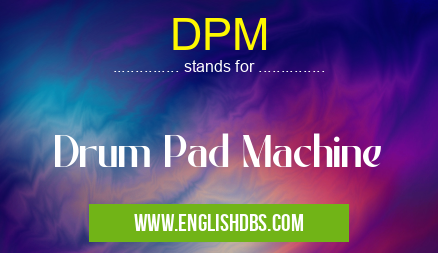What does DPM mean in UNCLASSIFIED
DPM stands for Drum Pad Machine. It is an electronic musical instrument used to create and play rhythmic patterns. DPMs are typically used in electronic dance music (EDM), hip-hop, and other genres where drum machines are common.

DPM meaning in Unclassified in Miscellaneous
DPM mostly used in an acronym Unclassified in Category Miscellaneous that means Drum Pad Machine
Shorthand: DPM,
Full Form: Drum Pad Machine
For more information of "Drum Pad Machine", see the section below.
How DPMs Work
DPMs consist of a grid of pressure-sensitive pads that are arranged in a specific pattern. Each pad represents a different drum sound, such as a kick, snare, hi-hat, or cymbal. When a pad is struck, it sends a signal to the DPM's sound module, which triggers the corresponding drum sound.
Features of DPMs
DPMs typically offer a wide range of features, including:
- Multiple drum kits: Users can choose from a variety of pre-programmed drum kits or create their own custom kits.
- Pattern sequencer: Allows users to create and edit rhythm patterns.
- Effects: Many DPMs include built-in effects such as reverb, delay, and distortion.
- MIDI connectivity: DPMs can be connected to other MIDI devices, such as synthesizers and drum machines.
Advantages of DPMs
DPMs offer several advantages over traditional drum machines:
- Portability: DPMs are typically small and lightweight, making them easy to transport.
- Versatility: DPMs can be used to create a wide variety of drum patterns, from simple beats to complex rhythms.
- User-friendliness: DPMs are relatively easy to learn and use, even for beginners.
Essential Questions and Answers on Drum Pad Machine in "MISCELLANEOUS»UNFILED"
What is a Drum Pad Machine (DPM)?
A DPM is an electronic musical instrument that allows for the creation and manipulation of drum sounds. It typically consists of a grid of velocity-sensitive pads, which when struck trigger pre-loaded or user-created drum samples.
How does a DPM work?
Each pad on a DPM is assigned a specific drum sound. When the pad is struck, a signal is sent to the DPM's sound module, which then triggers the corresponding drum sample. The intensity of the strike determines the volume and velocity of the sample playback.
What are the benefits of using a DPM over a traditional drum set?
DPMs offer several advantages over traditional drum sets, including:
- Compactness: DPMs are significantly smaller and more portable than acoustic drum sets.
- Versatility: DPMs allow users to access a wide range of drum sounds and patterns, making them ideal for various musical genres.
- Control over dynamics: The velocity-sensitive pads of DPMs provide precise control over the volume and intensity of drum hits.
- Integration with other electronic instruments: DPMs can be easily integrated with other electronic musical instruments via MIDI or USB connections.
What are some of the features to consider when choosing a DPM?
When selecting a DPM, it's important to consider the following features:
- Number of pads: The number of pads available determines the range of drum sounds that can be accessed simultaneously.
- Velocity sensitivity: Velocity sensitivity allows for dynamic control over the volume and intensity of drum hits.
- Sound library: The quality and variety of the built-in drum sounds can greatly impact the versatility of the DPM.
- External connectivity: MIDI or USB connections allow for integration with other electronic instruments or computer-based music production software.
How can I learn to play the DPM?
There are various resources available to help you learn how to play the DPM, including:
- Online tutorials: Many websites offer comprehensive guides and lessons on DPM techniques.
- Video demonstrations: YouTube and other video-sharing platforms provide a wealth of instructional videos covering different aspects of DPM performance.
- Music schools: Some music schools offer dedicated courses or workshops on DPM playing.
Final Words: DPMs are versatile and portable electronic musical instruments that can be used to create a wide variety of drum patterns. They are a valuable tool for musicians of all levels, from beginners to professionals.
DPM also stands for: |
|
| All stands for DPM |
